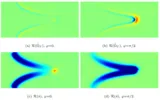Linearized Reactive Flows
by Aswathy Surendran, Moritz Merk, Grégoire Varillon and Wolfgang Polifke
A holistic approach for the linear stability of flames
The prediction and control of thermoacoustic combustion instabilities poses severe challenges to the development of efficient lean premixed combustion systems. A crucial input for current thermoacoustic models is the flame transfer function, which represents the response of the flame to acoustic forcing. It is currently deduced from costly high-fidelity numerical simulations, or strongly simplified analytic models, if not from extensive experimental measurements.
The Linearized Reactive Flow approach, recently explored by Avdonin et al. [2019b], appears as a promising alternative. Reactive flow equations are linearized around a base state, offering the opportunity to use linear stability analysis tools to determine not only the flame transfer function but also the stability of such dynamical systems from a holistic perspective. This model could be extended to complex reaction mechanisms, turbulent flames, etc.

Selected publications
G. Varillon , T. Kaiser , M. Merk , K. Oberleithner , W. Polifke. "Linearized reactive flows: An application to swirl flames", 18th International Conference on Numerical Combustion by The Combustion Institute, San Diego, CA, USA, 08-11 May, 2022
Acknowledgement

